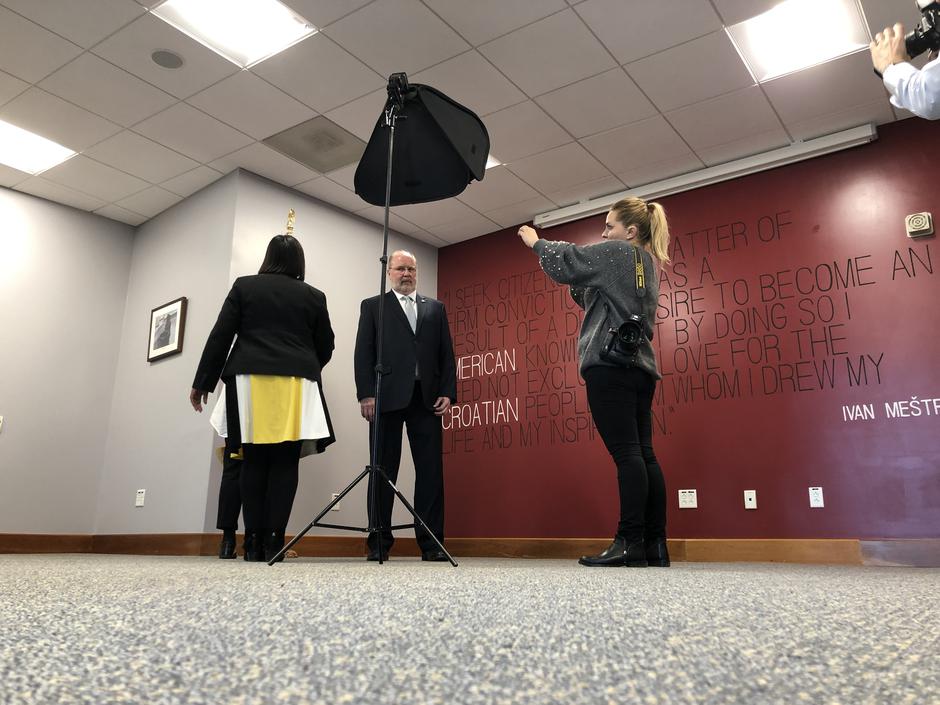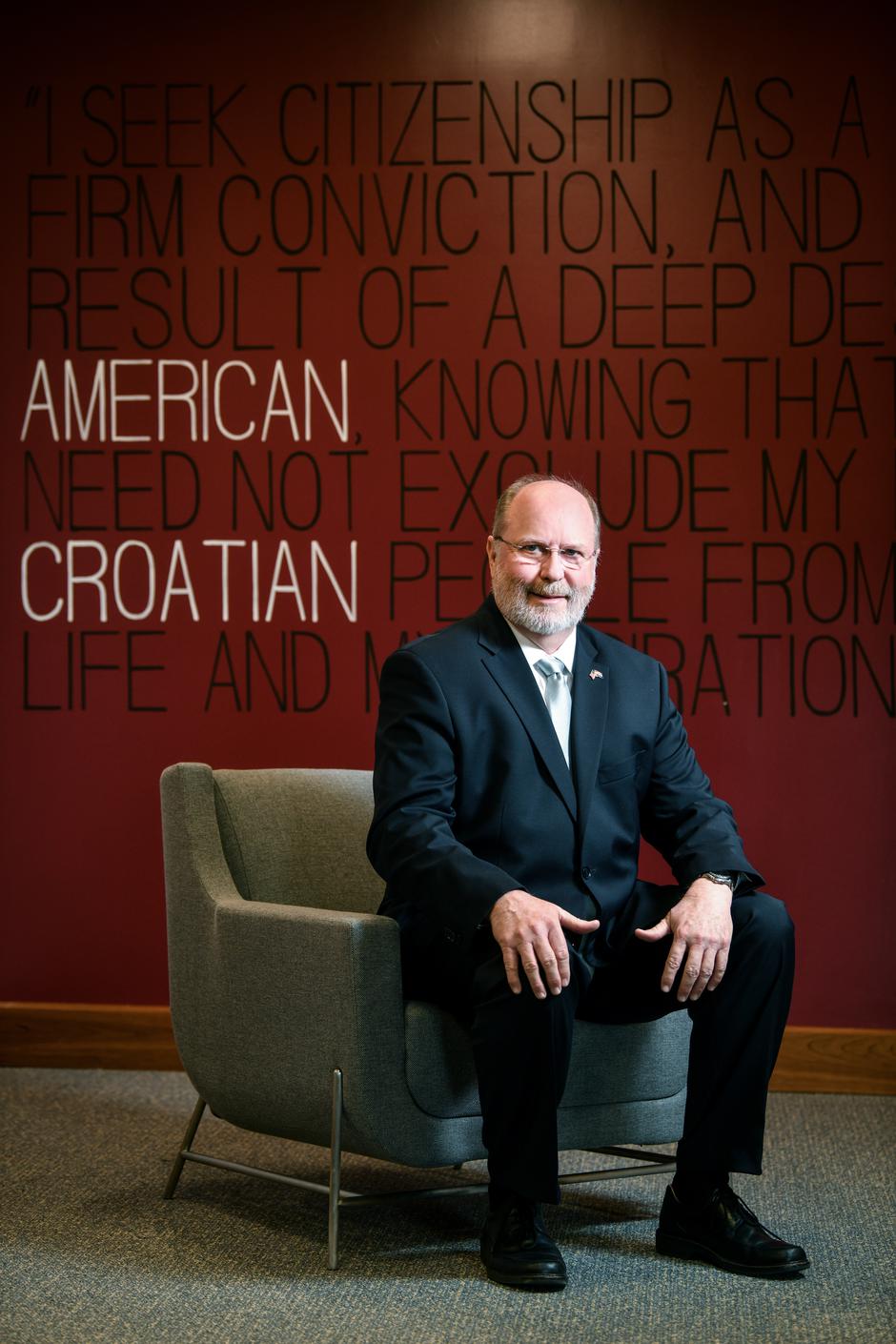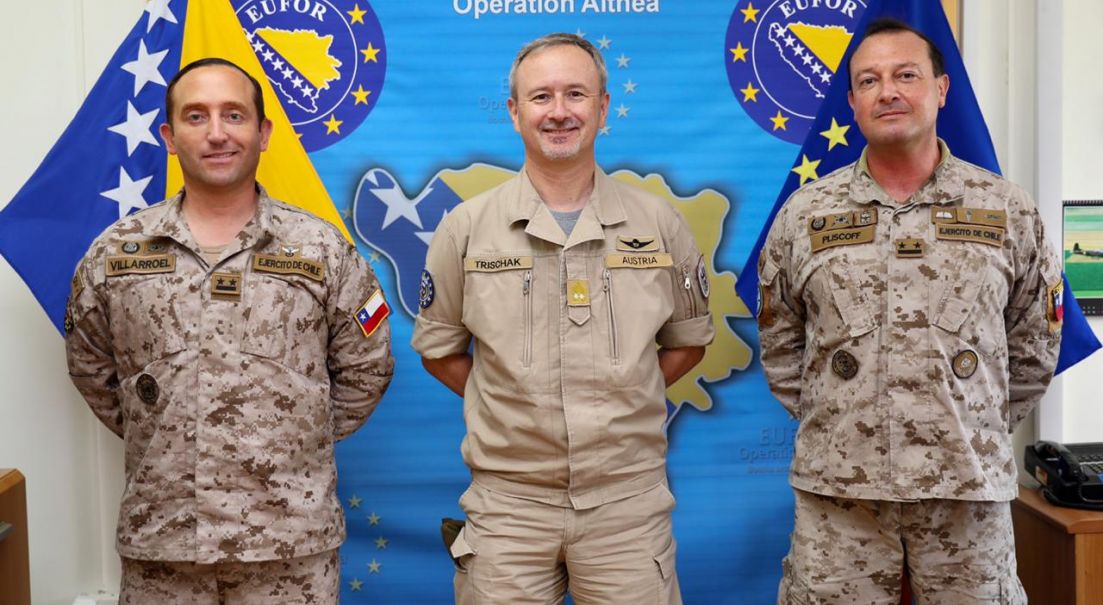Robertu Bobu Kohorstu već je prošlo 14 mjeseci mandata u Republici Hrvatskoj. Nije uvijek bilo mirno. Kupnja izraelskih zrakoplova F-16, koja je naprasno propala, dosta je, barem kroz pisanje medija i diplomatske kuloare, opteretila odnose SAD-a i Hrvatske. Oko toga, pak, ambasador je prilično opušten. Razumije hrvatske postupke, zadovoljan je kako je ministar Krstičević vodio pregovore. I ne prihvaća da je to bilo čiji poraz ili neuspjeh.
Kao iskusni i uspješni biznismen, kojeg je predsjednik Trump imenovao za veleposlanika u Republici Hrvatskoj, hvali racionalnu odluku koju je oko zrakoplova donijela Vlada. Uostalom, i Hrvatska mu je kao destinacija legla. Istina, kako je rekao, nema namjeru, nakon mandata, tu kupiti nekretninu. Ipak, u svemu su presudili veleposlanikovi unuci s kojima, nakon odlaska iz Hrvatske, želi provoditi puno vremena.
No dovoljno je pogledati njegov službeni profil na Twitteru kako bi ste shvatili da on i njegova gospođa jako vole i uživaju u Hrvatskoj.
Kako biste ocijenili razinu sveukupnih odnosa SAD-a i Republike Hrvatske? Je li propast gotovo potpisanog ugovora o kupnji američkih borbenih zrakoplova iz Izraela, iz poznatih razloga, pogoršala relacije između Washingtona i Zagreba?
Hrvatska i Sjedinjene Američke Države imaju odličnu suradnju na mnogim područjima. Pogotovo u vojnom segmentu. Doista ne vidim da je program kupnje zrakoplova F-16 završio neuspjehom. Sve što se dogodilo je dio procesa. SAD je, u tom smislu, spreman pomoći ako Hrvatska to zatraži.

Istina je da je Izrael prihvatio odgovornost zato što ugovor o prodaji zrakoplova nije potpisan. Istodobno, mediji u Hrvatskoj nisu mogli izbjeći pisanje o razočaranju zbog tvrdog stava SAD-a. Nije li vaša vlada mogla učiniti više kako bi se spasio cijeli posao?
Moje je mišljenje da su Sjedinjene Američke Države snažno stajale u podršci tog posla. Učinili smo sve ono što se od nas tražilo. Uključujući i tzv. Third Party Transfer (dopuštenje za prodaju američke tehnologije trećoj strani, op.a.). Sjedinjene Američke Države nisu razočarane. Rekao sam da na sve ovo gledamo kao na proces i da je ovo samo jedan korak u tom procesu. Nadamo se da će Hrvatska, u konačnici, sklopiti pravi posao i kupiti zrakoplove.
Što to znači kad kažete sklopiti pravi posao? Imate li neke indicije što će se dogoditi s nabavkom novih borbenih zrakoplova ili što planira hrvatska strana u sljedećim mjesecima?
Vlada je, mislim, pokazala interes za nastavkom procesa odabira borbenog zrakoplova F-16. Nemamo specifične informacije koji su točno planovi hrvatske strane. No mi smo prenijeli vašoj Vladi spremnost da se uključimo u proces kad oni to zatraže.
Stalno naglašavate kako je SAD bio vrlo jasan o uvjetima prodaje zrakoplova, uključujući i zahtjev za demontažom izraelske elektronike prije isporuke Hrvatskoj. Zašto bi onda Izrael pristupio tenederu imajući na umu stroge američke odredbe koje bi, sasvim je jasno, ubile ugovor s Hrvatskom već na samom početku?
Čujte, nemam pojma kakve su bile nakane izraelske strane od ulaska u pregovore. Od početka je postojalo očekivanje da će zrakoplovi dobiti opremu sukladnu NATO standardima što je posebno važno za Hrvatsku. Ti zrakoplovi su morali biti u stanju komunicirati s drugim zrakoplovima kako bi postali dio vrijednih kapaciteta Saveza. Dakle, znalo se da će avioni trebati opremu koja je kompatibilna NATO-u. Ali zaista ne mogu ništa reći o tome kakve su bile namjere uključenih strana.
Što biste rekli na tvrdnje da je Hrvatska ispala kolateralna žrtva konflikta Izraela i Sjedinjenih Američkih Država, a ne tek trapavi kupac, kako se to pisalo u hrvatskim medijima?
Ne bih rekao da je riječ o sukobu. Više o procesu. U svake pregovore su uključene različite strane. One trebaju postići dogovor s kojim će svi biti zadovoljni. Nije do toga došlo, a to je opet dio procesa. Ako Hrvatska želi, sad može ponovno pokrenuti nabavku borbenog zrakoplova. Vjerujem da će, na kraju, vaša zemlja učiniti ono što će za nju biti najbolje. Ništa nije propalo, to je proces kako bi se pronašlo najbolje rješenje.
Hoćete li biti razočarani ako Hrvatska, primjerice, kupi borbene zrakoplove koji nisu proizvedeni u Sjedinjenim Američkim Državama, unatoč vašem angažamanu?
Svakako bismo voljeli da Hrvatska kupi američke zrakoplove F-16. A koje točno, odlučit će Hrvatska. Ali da. Htjeli bismo da ih kupite.
Kako biste odgovorili na tvrdnje iz medija da je odluka o zaustavljaju prodaje izraelskih F-16 donesena ovdje, u ambasadi u Buzinu kraj Zagreba, a ne u Washingtonu?
Ovo veleposlanstvo, naše Ministarstvo vanjskih poslova i naše Ministarstvo obrane potpuno su podupirali prodaju zrakoplova Republici Hrvatskoj. Učinili smo sve što je bilo u našoj moći da Hrvatskoj omogućimo da postigne svoj cilj. Nismo vas blokirali ili se na taj način uplitali.

Što kažete na informacije da ste umalo bili proglašeni personom non grata?
Ne znam ništa o tome. Mislim da to nema veze s istinom niti da se o tome ozbiljno razgovaralo.
Hrvatski ministar obrane Damir Krstičević bio je pod neviđenim pritiskom zbog toga jer nije potpisan ugovor. Kakvo je vaše mišljenje o pozivima hrvatske oporbe na njegovu ostavku?
Ministar Krstičević je sudjelovao u pregovorima i smatram da je učinio posao za svaku pohvalu. Ne mislim da je na meni da ocjenjujem njegove postupke. Ti su pregovori bili složeni, ali kako se to zna dogoditi u poslu, dvije strane, Hrvatska i Izrael, nisu postigle zadovoljavajući dogovor. Zato je Hrvatska odustala. Uvijek treba biti spreman reći ne ako niste zadovoljni ishodom. To je ispravna odluka Vlade RH koja je time, između ostaloga, zaštitila i sačuvala hrvatski proračun.
Održan je niz sastanaka između vas i ministra obrane. O čemu ste razgovarali, jeste li pružali neke savjete hrvatskoj strani i, ako jeste, koje?
Sadržaji sastanaka između predstavnika Vlade SAD-a i Republike Hrvatske su povjerljivi. Ne smijem ulazili u detalje. Tijekom pregovora trudili smo se pružati podršku kad je to od nas traženo. Ni u jednom trenutku nismo se neprimjereno postavili ili sprečavali pregovore.
Okej, ali jeste li kao američki diplomat s mandatom u Hrvatskoj razočarani činjenicom da ovaj posao nije uspio?
Nisam. Uopće. Mislim da je Hrvatska ispravno postupila odbacivši sporazum koji im nije osigurao ono što su željeli. Tako se i treba postaviti kad ne postižete ono što vam treba.
Sad iz vas kao da progovara biznismen...
Biznismen bi napravio istu stvar kao i političar. Treba zaštititi svoj novac, zaštititi proračun i postići ono što zapravo želite. Ako je za to potrebno više vremena ili drugi krug pregovora, neka tako bude. To je sasvim prihvatljivo. Hoću reći da je Hrvatska učinila baš ono što je trebala.
Kako će se razvijati američko-hrvatska vojna suradnja u budućnosti? Primjerice, Srbija je iz Rusije, Kine i Bjelorusije dobila značajne količine naoružanja i vojne opreme. Imajući na umu ne tako davna iskustva, Hrvatska nije baš sretna takvom situacijom. Slažete li se?
Ne znam što su to Rusija i druge države dale Srbiji, ali znam da SAD snažno podržava hrvatske oružane snage. Tijekom proteklih godina donirali smo Hrvatskoj više od pola milijarde dolara vojne opreme, uključujući borbene helikoptere Kiowa Warrior, borbena vozila i oklopna terenska vozila, pokretne kuhinje, dva Black Hawk helikoptera vrijedna više od 50 milijuna dolara... Dakle, snažno podupiremo hrvatske oružane snage kako u opremi, tako i u obuci koju organiziramo za hrvatske časnike na američkim vojnim učilištima. Nije, naravno, sve u vojnoj opremi, važan je stupanj znanje i obuke. Mi, dakle, vjerujemo da imamo posebno vojno partnerstvo s Hrvatskom.
Možete li, molim vas, objasniti koji je financijski interes Republike Hrvatske u gradnji LNG terminala koji snažno gura i podržava vaša vlada u Washingtonu?
LNG terminal se planira već godinama. Jako sam sretan što se sad cijela stvar realizira. Ovo je strateški projekt za Hrvatsku i ovu regiju. Uz to, to je zaista projekt Europske unije i Hrvatske. Oni daju više od 100 milijuna eura što pokazuje njihovu snažnu predanost energetskoj diversifikaciji i sigurnosti. Mogu također radosno dodati da će Sjedinjene Američke Države poduprijeti projekt. LNG terminal će, dakle, biti vrlo velika prednost za cijelu regiju te će isto tako potvrditi da je Hrvatska kredibilan partner unutar Europske unije.
Pročitajte više na: https://express.24sata.hr/top-news/trumpov-covjek-za-hrvatsku-da-rucao-sam-s-hernadijem-20752?page=2 - express.24sata.hr













